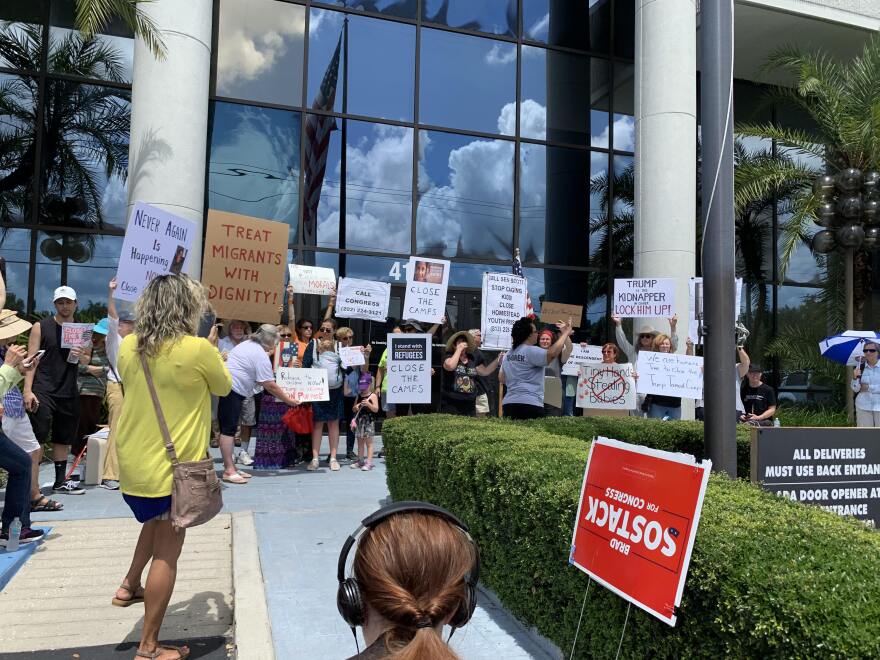Two prominent Republican senators will push to require Florida private employers to use the E-Verify system to check the immigration status of new workers, as the presidential election kicks into full swing next year.
The bill, filed Thursday by Sen. Tom Lee, R-Thonotosassa, and Sarasota Sen. Joe Gruters, the chairman of the Republican Party of Florida, is expected to draw heated and emotional debate over immigration during the 2020 legislative session.
Like in past years, the proposal is likely to face fierce opposition from agriculture, tourism and construction interests, some of whom are big GOP political donors.
The bill, as filed, would apply to all Florida private employers -- big and small, Lee said. That would include the state’s largest businesses, like Disney, and Publix, the Mar-a-Lago resort in Florida, or “any person or entity that employs persons to perform labor or services” in exchange of money, the bill says.
RELATED: Florida Republicans Craft Immigration Policy Ahead of 2020
“It has to make sense, and it has to be rational. It can’t be some deal we cut to a special industry because they have a special status in the Legislature,” Lee told The News Service of Florida on Friday.
Yet, Lee said he is “open minded” about making changes to the bill, including exemptions for certain types of businesses.
“When it comes to small businesses, I think you are going to have a lot of empathy,” Lee, a former Senate president, said. “I am not sure what the rationale would be for (exempting) large businesses. It seems like they would be perfectly equipped to have this type of system.”
If the Legislature requires all private employers to use E-Verify, businesses would need to run every new hire through an electronic system to verify eligibility to work in the United States.
Employers would lose “all applicable licenses” if they do not register with the E-Verify system, operated by the U.S. Department of Homeland Security. Under the proposal, such licenses could include a franchise, a charter, or “approval” to run a business in the state.
The bill includes some exemptions. For example, the employer definition would not include homeowners or people who hire someone to do "casual labor" at their residences, which, under state law, could include cleaning or gardening services.
The proposal also would offer employers who are registered to use E-Verify immunity from civil legal action if they hire undocumented workers after the system erroneously said the workers were eligible to be employed. Also, businesses would receive immunity if they check E-Verify and deny jobs to legal workers if the system said the people were not authorized to work in the country.
Lee said he has not talked to the offices of Senate President Bill Galvano or Gov. Ron DeSantis about the proposal and said he filed the bill Thursday to “get this conversation moving.”
DeSantis’ office told the News Service of Florida in September that the governor’s support for E-Verify is “unwavering” and that he would support legislation mandating the system for private employers.
If the governor gets E-Verify approved next year, it would be his second triumph on immigration. He signed a bill this year that banned so-called sanctuary cities in Florida, a measure sponsored by Gruters and Rep. Cord Byrd, R-Neptune Beach. Also, immigration is expected to be a major issue during the 2020 presidential race as President Donald Trump --- a close DeSantis ally --- runs for a second term.
Lee said Friday that he stands by statements he made in May, when the Senate was debating the sanctuary city bill. At the time, he said it would make more sense to put E-Verify in place than a sanctuary city ban, if the state wants to deter illegal immigration.
“This is much more central to the problem, because the job market is the magnet for illegal immigration,” Lee said. “Employers have a role that they can play in this, but I know they don’t want to play a part in the solution because it adds another burden on them.”
Byrd told the News Service he intends to file an E-Verify bill in the House ahead of the 2020 session, which starts Jan. 14. In September, he was still ironing out details on the proposal.
“Under the umbrella of E-Verify, there are a lot of nuances that we need to figure out,” Byrd said in September.
Lee characterized Byrd, who is an attorney, as “a lawyer’s lawyer,” adding that he expects to learn "a lot" from him on E-Verify.



![Orange County Mayor Jerry Demings says he does not want a shelter for unaccompanied minors in Central Florida. [WMFE]](https://npr.brightspotcdn.com/dims4/default/e927a30/2147483647/strip/true/crop/544x360+48+0/resize/130x86!/quality/90/?url=http%3A%2F%2Fnpr-brightspot.s3.amazonaws.com%2Flegacy%2Fsites%2Fwusf%2Ffiles%2F201908%2Fdemings082719.jpg)


